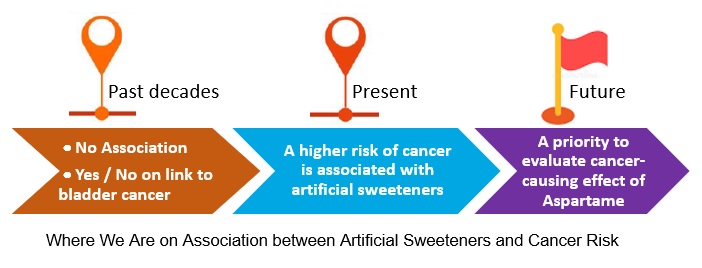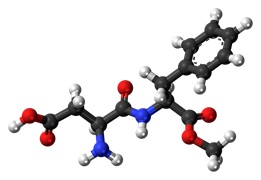 When it comes to artificial sweeteners, do you have mixed feelings? Are you confused about its link to cancer risk or not? Well, you’re not alone.
When it comes to artificial sweeteners, do you have mixed feelings? Are you confused about its link to cancer risk or not? Well, you’re not alone.
All over scientific literature, this topic remains intensely controversial. I summarized where we are on an association between consumption of artificial sweeteners and risk of cancer in a flowchart illustration here.
Briefly, little or no evidence from past decades shows common artificial sweeteners have a cancer-causing (i.e., carcinogenic) potential, except a link to bladder cancer in animals but inconsistent results in humans. The US FDA also approved the safety of several artificial sweeteners as food additives.
However, this view has shifted in recent publications. Especially, a large epidemiological study (102,865 adults, follow-up nearly 8 years) found that participants who heavily consumed artificial sweeteners—aspartame and acesulfame-K—showed a 13-15% higher risk of cancer (e.g., breast, obesity-related cancer), compared with non-consumers (Debras et al. PLoS Med. 2022). Keep in mind that obesity is linked to more than ten types of cancer. Meanwhile, the International Agency of Research on Cancer (IARC) would place a high priority in the near future to evaluate the possible carcinogenic effect of aspartame on humans, as recommended by its advisory group.
So, what do you do? How the renewed awareness influences your choice on a healthy and palatable diet?
Artificial sweeteners exist in a wide variety of food (especially those packaged or processed), drinks, drugs, and hygiene products. Therefore, virtually everybody uses or ingests artificial sweeteners, knowingly or not.
An immediate concern is about unanticipated or undesirable consequences from its regular consumption, along with confusion, or worse, disinformation.
But this is more complex than what one may think.
To help clarify it, let’s examine what helps and what hurts in critical areas, so that you can strike a balance between benefits and risks, and make wise choices.
What helps –
 We all have a sweet tooth, and often add a little amount of sugar to enhance our food’s flavors and pleasure.
We all have a sweet tooth, and often add a little amount of sugar to enhance our food’s flavors and pleasure.
Artificial sweeteners—as sugar substitutes—are calorie-free and nutrient-free. With their sweet taste or perception, these food additives may affect certain health outcomes. For instance, they are used as a strategy to reduce calorie intake in weight loss programs, though controversies exist. Furthermore, as for whether these sweet alternatives are advantageous, there is little evidence based on long-term studies to demonstrate that.
What hurts –
 After all, artificial sweeteners are synthetic chemicals hidden in packaged foods and soft drinks, which are different from natural sugar contained in fruits and vegetables.
After all, artificial sweeteners are synthetic chemicals hidden in packaged foods and soft drinks, which are different from natural sugar contained in fruits and vegetables.
Excessive sugar intake can negatively impact human metabolism and health. Likewise, excessive consumption of artificial sweeteners is undoubtedly risky.
Of potentially grave concern is those pregnant women and young children who consume aspartame-containing foods and beverages in a large quantity, because research reveals that offspring of rodents exhibit increased incidence of leukemia and lymphoma after fetal or prenatal exposure to aspartame. And there is a clear dose-response correlation between aspartame exposure and occurrence of blood or lymphatic malignancies. Obviously, aspartame is a carcinogen in rodents.
Paradoxically in dietary intervention to counter weight gain, artificial sweeteners might not be as efficient as expected, or at least need to be considered cautiously.
First, we know that sugar is a driver of inflammation and weight gain, and artificial sweeteners are also inflammatory foods. After reviewing more than 100 studies that investigated aspartame in both higher (>40 mg/kg/d) and safe (<40 mg/kg/d) dosages, and ascertaining its harmful effects on various cells, tissues and organs, the authors concluded “aspartame use could not only exacerbate existing systemic inflammation but also cause inflammation if healthy individuals ingest it on a regular basis” (Choudhary & Pretorius. Nutr Rev. 2017).
Chronic, low-grade inflammation is a significant risk factor for the development of many diseases including cardiovascular diseases, diabetes, cancer, neurological disorders (e.g., Alzheimer’s), and arthritis, right? So is malnutrition (or micronutrient deficiency). Malnutrition is associated with not only lower body weight but also obesity.
Taken together, it’s important to understand adverse effects of artificial sweeteners and their metabolites. For individuals with or susceptible to inflammatory bowel disease, it’s critical to avoid or at least limit artificial sweeteners, processed foods, and sugar-sweetened beverages.
Again, lifestyle with a healthy diet is an integrative, effective solution. If you eat more veggies, fruits and less processed foods, you easily curb added sugar or artificial sweeteners without loss of nutrients. For example, you may sprinkle fresh fruits (such as pineapples, oranges, or watermelon, etc.) or dried fruits (such as raisins or dates) onto your salad (or other dish) as a sweet addition—not only making it palatable but also supplying antioxidants (i.e., a bonus). Alternatively, use a tiny amount of honey or maple syrup, when necessary, which is relatively healthier than artificial sweeteners.
So, take-home points:
Enjoy nutrients-dense foods and reduce sugar intake overall. Specifically, eat plenty of fruits and veggies for natural sweetness, and engage in more physical activity to prevent inflammation.
Image Credits: CancerPreventionDaily, Pixabay
Key References: click here
